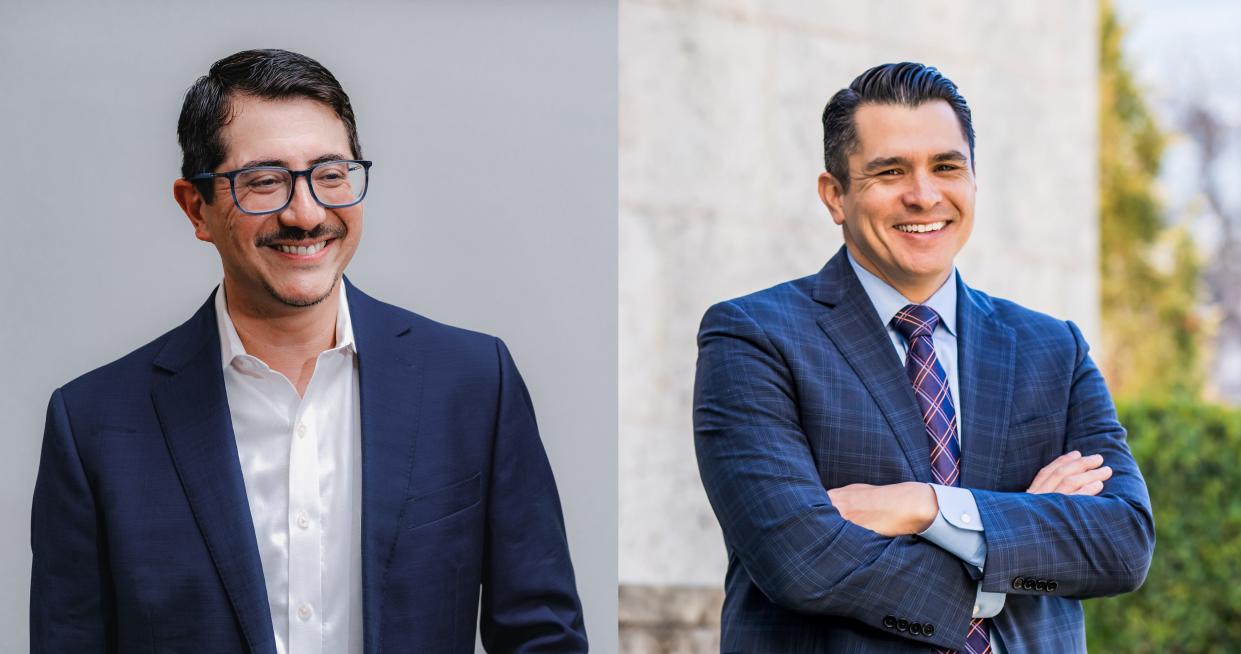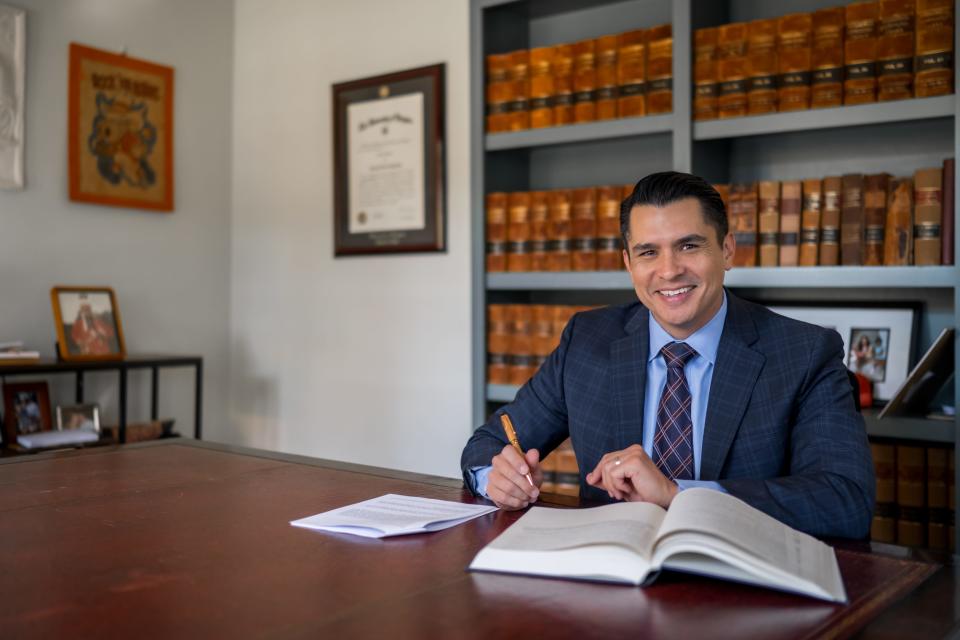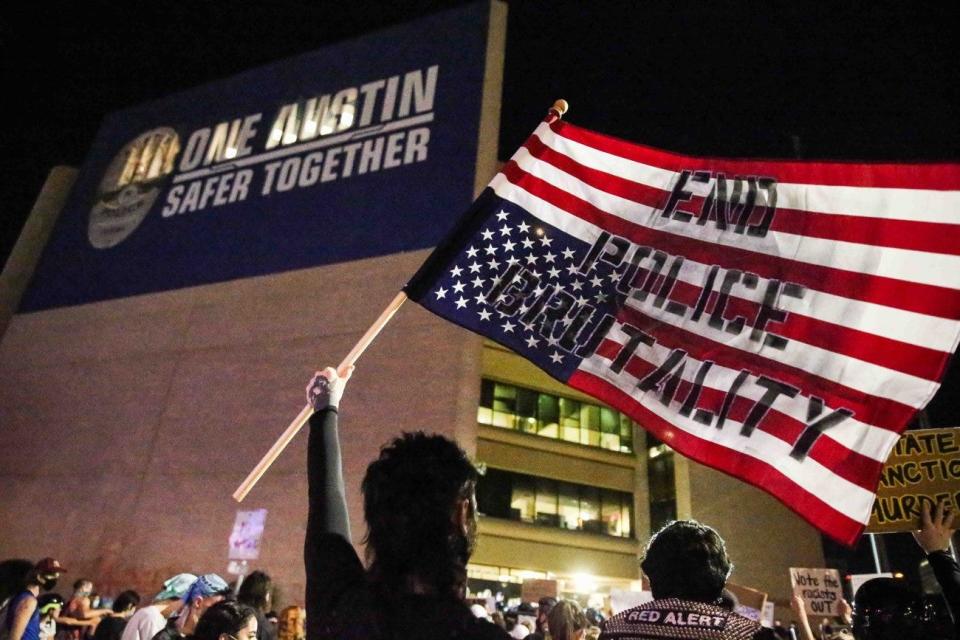Competing philosophies of public safety at center of Democratic primary for district attorney

Editor’s note: This story has been updated with a new statement from Daniel Betts, the Republican candidate for Travis County district attorney, about his stance on the Democratic primary race for district attorney.
At the center of the Democratic primary race for Travis County district attorney is a disagreement over what public safety looks like and what role the county’s top prosecutor should play in shaping it.
Jeremy Sylestine, who is seeking to unseat José Garza, ended his 15-year tenure in the prosecutor’s office early in Garza’s term. Now a defense attorney, he argues that Garza has remade the office of the district attorney at the expense of public safety.
The race is perhaps the most closely watched of those that will appear on the March 5 primary ballot.
Garza, who was elected in 2020 on the heels of a national movement for racial justice and police accountability, campaigned on having never prosecuted a criminal defendant. Garza worked as a public defender on the Texas-Mexico border and helmed the labor rights organization Workers Defense Group.
In 2020, he told the American-Statesman that a long history of “career prosecutors” inhabiting the office of the district attorney has led to “gross disparities in the criminal justice system.” Travis County voters seemed to agree with him: Garza won in a landslide during the primary runoff, ousting one-term incumbent Margaret Moore.
In his time at the district attorney's office, Sylestine prosecuted child abuse and domestic violence cases before moving into the major crimes division. He has argued that the position needs someone with experience inside the system — and that the office has suffered without someone like him at the top.
Sylestine’s promise to voters is that he will maintain “progressive policies” while practicing “common sense prosecution principles.”
“You don't have to tear the system down to make it work,” Sylestine said.

In a heavily blue county, the winner of the Democratic primary will almost certainly win the general election.
The lone Republican candidate for district attorney, Daniel Betts, said that "for Austin's sake" he hopes Sylestine will be the Democratic nominee. He said he is encouraging other Republicans to cross party lines in the primary to vote for Sylestine.
Sylestine faces an uphill battle to persuade voters to oust Garza and his — thus far — popular approach to criminal justice.
The future of the progressive prosecutor
The March primary will measure how voters feel about Garza’s first term, almost four years out from the racial justice protests that ushered him in.
Elections in which a candidate is seeking reelection are generally a “referendum on the incumbent,” said David Butts, an Austin political consultant who is advising the Sylestine campaign.
Nationally, an overwhelming majority of progressive prosecutors have won their reelection races, said Rebecca Goldstein, a professor at the University of California, Berkeley School of Law.
It is likely that fewer voters will participate in this year’s Democratic primary than in 2020, said Joshua Blank, the research director of the Texas Politics Project. In 2020, turnout in the Democratic primary was notably high — about 226,000 people voted. This year, without a competitive Democratic primary for president, there will probably be less participation in local races.
How that will translate into the political makeup of the primary electorate is still unclear.
Will voters respond to 'soft on crime' rhetoric?
Much of Sylestine’s campaign has focused on public safety, which he argues that Garza has neglected in pursuit of overly ambitious policy goals.
Sylestine entered the race shortly before the filing deadline in December, which he attributed to a “late momentum” of people asking if he would run. He said his candidacy represented a rebuke — particularly of Garza’s policies on violent crime — from within the Democratic Party.
“The call is coming from within the house,” Sylestine said.
But Garza said that his office takes “very seriously” the responsibility of holding people accountable for violent acts. In his view, preserving public safety entails not just punishing people for committing crimes, but also going farther to “address the root causes of crime in our community.”

Garza touted office initiatives such as the Travis County Transformation Project, a collaboration with law enforcement to address juvenile violence, and his efforts to address gun violence.
In an interview with the Statesman, Garza was insistent that “progressive values further our public safety.”
Sylestine’s concerns about crime policy might not translate well to Democratic primary voters.
“Public safety has become a very partisan issue in Travis County,” said Jim Wick, an Austin-based political consultant and pollster. Democratic voters, he said, tend to want “reform, oversight and accountability” when it comes to the justice system.
Attitudes about public safety are also shaped by how safe voters think Austin and Travis County are, and Wick said that tends to fall along party lines, too.
Sylestine has drawn attention to how people who are accused of violent crimes are released from jail. This has been a subject of considerable attention from vocal critics of Garza, particularly conservatives and representatives from law enforcement unions.
Sylestine claimed that when Garza came into office he instituted a policy that “presumes” people should be eligible for the “least restrictive” bond — which Sylestine said creates “dangerous situations.”
Garza disputed the claim that the office has a bond policy and said that the practice is for prosecutors to review bonds based on community safety.
Moreover, bail is initially set by a municipal judge during a process called magistration, typically outside the presence of prosecutors or defense attorneys. The judge makes the decision using the arrest affidavit and documents prepared by the county’s pretrial services division, including a public safety report.
A prosecutor is not likely to see the case until a week or two after magistration, according to Garza.
Has pursuit of accountability led to a strained relationship with Austin Police Department?
During his 2020 campaign, Garza promised to hold police accountable and seek indictments for officers who abuse their position. The endeavor has faced considerable challenges and drawn criticism from law enforcement representatives.
In total, Travis County grand juries indicted 21 officers for aggravated assault for the use of “beanbag” rounds during the May 2020 racial justice protests. Late last year, the district attorney’s office dismissed 17 of those cases. Garza, along with Mayor Kirk Watson, asked the Department of Justice to review the Austin Police Department’s conduct during the protests.
During Garza’s tenure, the district attorney’s office also prosecuted Austin police officer Christopher Taylor, who fatally shot Michael Ramos in April 2020. The trial, which began in October 2023, ended in a hung jury. Taylor will probably be retried in September.
In an interview with the Statesman, Sylestine walked a fine line between pursuing police accountability and what he called Garza’s “agenda” of “going after” police officers.
Sylestine said that prosecutors and police officers should have a “symbiotic” relationship, though Garza’s approach has made it “dysfunctional.”
Garza disagreed with this characterization.
“We work every day with law enforcement to make our community more safe,” he said.
Garza pledged to continue holding officers accountable for excessive use of force “because it’s against the law,” he said. Moreover, he argued, it helps inspire confidence in the fairness of the justice system.
Kathy Mitchell, an adviser at the social justice organization Equity Action, said that the group would once again support Garza's campaign. She felt that Garza had done his best to hold police accountable given that cases against police officers are "incredibly tough" because both law enforcement unions and police departments rally around defendants.
In an interview with the Statesman, Garza was confident that voters will respond to the same promises of reform and accountability. He said he "has no doubt" that the same communities that elected him would return to the voting booth and “ensure that our criminal justice system lives up to their aspirations.”
This article originally appeared on Austin American-Statesman: Democratic candidates for district attorney at odds on handling crime

